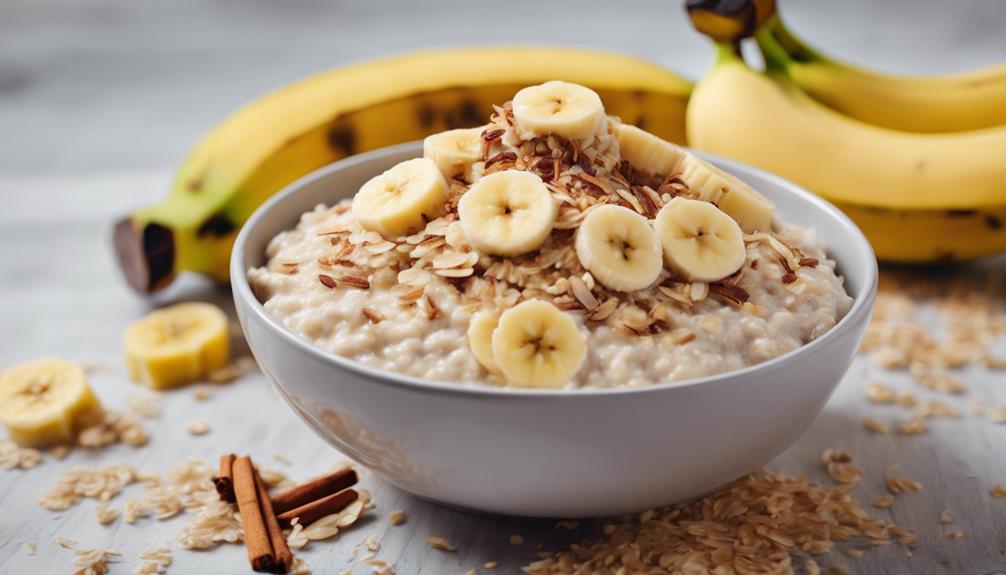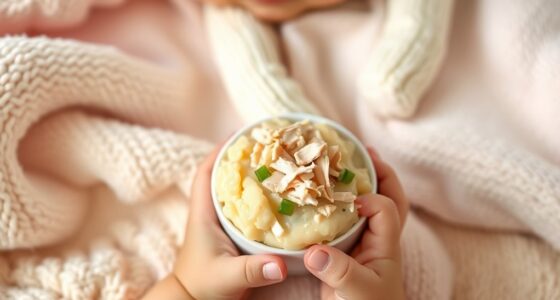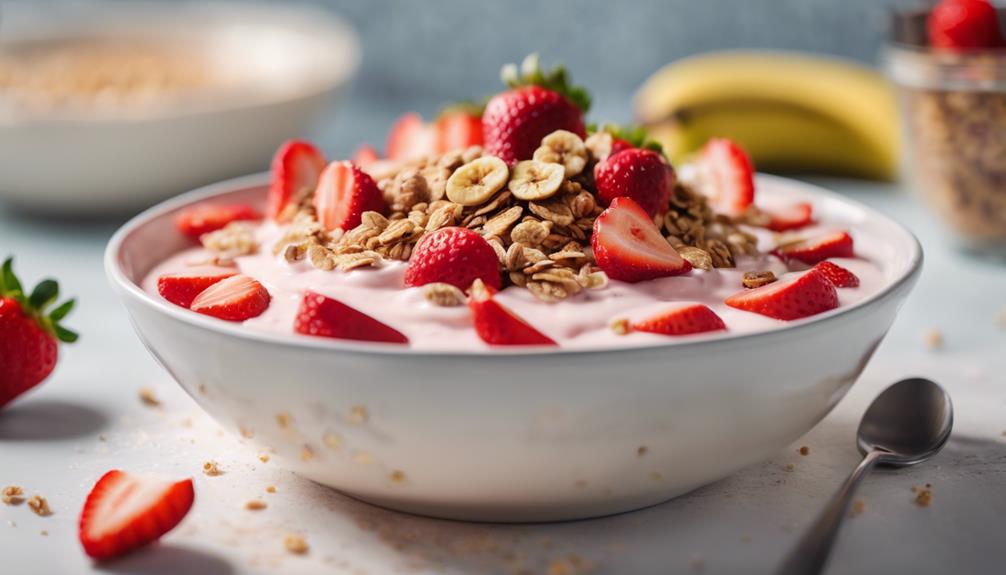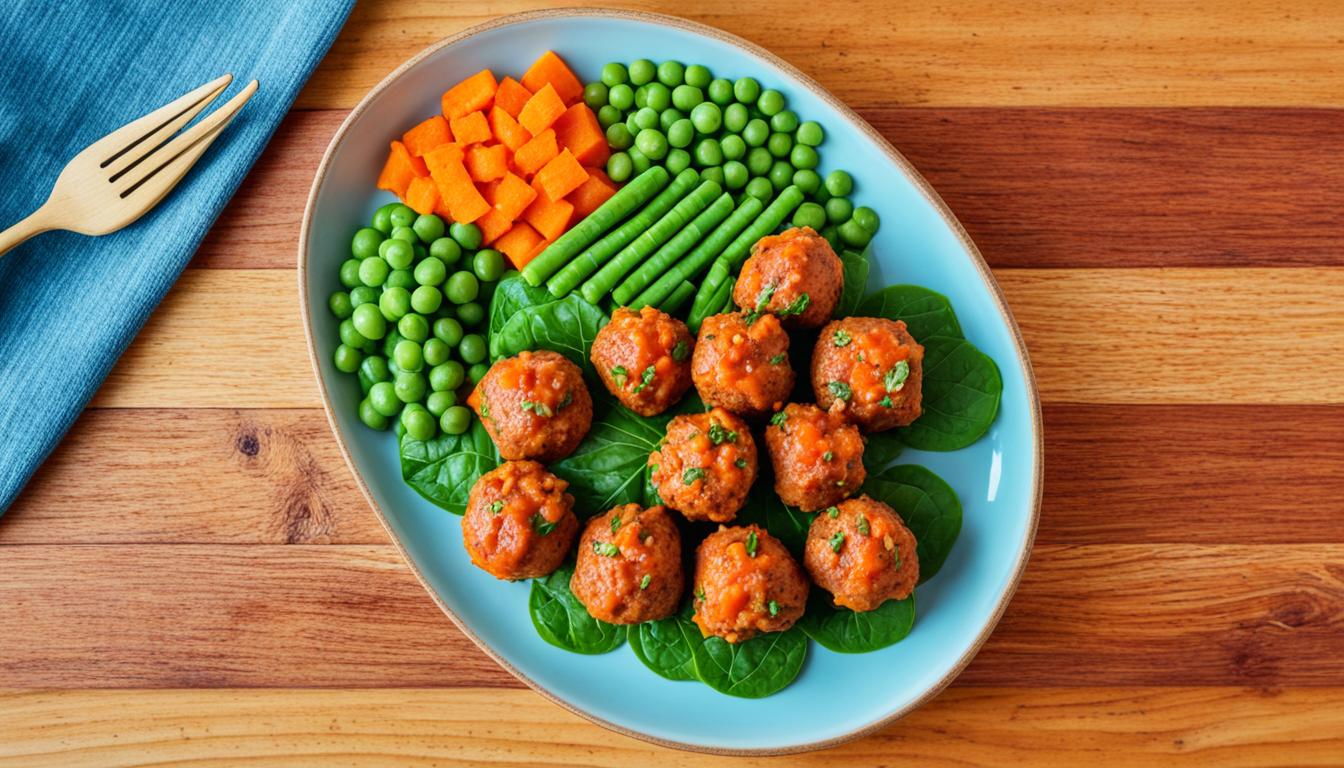Indulge your baby in the vibrant and nutritious world of golden beet puree! Packed with essential nutrients like iron and potassium, this puree supports your baby's development and boosts their immune system. The versatility of golden beets allows for culinary creativity in preparing diverse and healthy baby food recipes. To guarantee freshness and quality, making homemade baby food with golden beets can be a cost-effective and nutrient-dense choice. Explore the benefits and preparation steps for this vibrant puree to provide your baby with a wholesome start.
Key Takeaways
- Golden Beet Puree is rich in essential nutrients and antioxidants for baby's health and development.
- Incorporate diverse ingredients like tarragon, yogurt, sweet potatoes, and prunes for balanced flavors and nutrients.
- Golden beets offer iron, potassium, and energy, while sweet potatoes provide vitamins A and C.
- Culinary versatility allows for creative combinations with golden beets as a nutritious base.
- Ensure readiness for solids around 4-6 months and consult a pediatrician for personalized advice.
Top picks for "golden beet puree"
Open Amazon search results for this keyword.
As an affiliate, we earn on qualifying purchases.
Golden Beet Puree Benefits
Rich in essential nutrients and antioxidants, Golden Beet Puree offers numerous benefits for your baby's health and development. When introducing baby food, beet puree stands out as a powerhouse of iron and potassium, essential for your little one's growth and well-being.
Additionally, the vibrant hue of golden beets signifies the presence of antioxidants, which play a crucial role in supporting a strong immune system for your baby.
Beyond its nutritional value, the mild and sweet flavor of golden beet puree can be a delightful introduction to new tastes for your baby. This gentle taste profile makes it a suitable choice for babies at Stage 1, providing them with essential fiber for optimal digestive health.
Essential Ingredients for Baby Food

When preparing baby food, it's essential to focus on key ingredients that offer a variety of nutrients and flavors. Nutrient-rich options like sweet potatoes and prunes provide essential vitamins and fiber for your baby's development.
Their culinary versatility allows you to create diverse and nutritious purees that cater to your baby's growing needs.
Key Baby Food Ingredients
For essential components in baby food, incorporating key elements like beets, tarragon, yogurt, sweet potatoes, and prunes is important for providing necessary nutrients and flavors for your little one's development.
Golden beets are a versatile choice, packed with fiber, antioxidants, and vitamins vital for your baby's growth.
Tarragon, known for its savory taste, can enhance the flavor profile of baby food without being too overpowering.
Yogurt is a valuable addition due to its probiotics and calcium content, supporting healthy digestion and bone strength in infants.
Sweet potatoes, rich in beta-carotene, not only aid in eye health but also bring a natural sweetness to baby purees.
Lastly, prunes serve as a natural fiber source, aiding in digestion regulation for your little one.
Nutrient-Rich Options
Consider incorporating nutrient-rich ingredients like golden beets, tarragon, yogurt, sweet potatoes, and prunes into your baby's diet for essential nutrients and flavors. These ingredients offer a range of health benefits vital for your little one's growth and development:
- Golden Beets: These vibrant root vegetables are packed with iron and potassium, essential for your baby's overall health. Including golden beets in your baby's diet can help boost their nutrient intake, supporting their growth and energy levels.
- Sweet Potatoes: With their creamy texture and high levels of vitamins A and C, sweet potatoes are an excellent addition to baby food recipes. They provide immune support and contribute to your baby's healthy development, making them a nutritious choice for homemade purees.
- Prunes: Natural sources of fiber, prunes aid in regulating digestion in babies. Including prunes in baby food recipes can help prevent constipation and maintain a healthy digestive system, ensuring your baby stays comfortable and happy.
Culinary Versatility
Explore the culinary versatility of essential ingredients like golden beets, tarragon, yogurt, sweet potatoes, and prunes in creating diverse baby food recipes.
Golden beets, known for their vibrant color and earthy sweetness, serve as a nutritious base for various baby food combinations. When paired with the distinct flavor of tarragon, the sweetness of golden beets is enhanced, offering a unique taste profile that can intrigue young palates.
Yogurt, with its creamy texture and probiotics, not only adds a smooth consistency to baby purees but also promotes gut health.
Sweet potatoes, rich in nutrients and natural sweetness, complement golden beets well, creating a balanced and flavorful baby food option.
Additionally, prunes, acting as a natural sweetener, contribute to digestion and add a hint of sweetness to baby food recipes.
Preparation Steps for Beet Puree

To prepare the golden beet puree, start by washing and trimming the root and stem ends of the beets before cooking.
Here are the steps to follow for a smooth and nutritious baby food:
- Boil the Beets: Place the washed beets in a pot, cover them with water, and cook until they're soft and tender. This will make them easier to blend later on.
- Remove Skins: Once the beets are cooked, allow them to cool before gently rubbing off the skins. This step guarantees a silky texture in your puree.
- Blend with Water: Cut the beets into smaller pieces and gradually add water to the blender. Blend until you achieve a smooth consistency, adding more water if needed.
Storage Tips for Homemade Baby Food

When storing homemade baby food, it is important to utilize airtight containers in the fridge for up to 5 days to keep the food fresh. This helps maintain the quality and safety of the food for your little one. For longer storage, freezing homemade baby food is a great option. Freeze the baby food in ice cube trays and then transfer the frozen cubes to freezer bags. This method allows you to store the baby food for up to 6 months while preserving its nutrients.
Here are some storage tips for homemade baby food:
| Storage Tip | Details |
|---|---|
| Fridge Storage | Store in airtight containers for up to 5 days. |
| Freezer Storage | Freeze in ice cube trays, then transfer to freezer bags. |
| Thawing Instructions | Thaw 1-2 cubes in the fridge overnight or at room temperature. |
Nutritional Facts of Golden Beets

Rich in fiber and antioxidants, golden beets provide essential nutrients for your baby's growth and overall well-being. Here are some key nutritional facts about golden beets:
- Digestive Health: Golden beets are rich in fiber, which aids in digestion and promotes a healthy gut environment for your baby.
- Iron Content: A single golden beet contains approximately 10% of the recommended daily intake of iron for babies, essential for their growth and development.
- Potassium Source: Golden beets are a good source of potassium, supplying about 50% of the recommended daily intake for infants. Potassium is vital for maintaining healthy blood pressure and proper muscle function in your little one.
These nutritional benefits, coupled with the mild and sweet taste of golden beets, make them a versatile and nutritious option for homemade baby food.
Suitable for Stage 1 baby food, golden beets offer a nutrient-rich choice for introducing new flavors to infants aged 6 months and older.
How Little Spoon Works

Little Spoon efficiently delivers organic and non-GMO Babyblends right to your doorstep, simplifying meal planning for busy parents like you. When it comes to introducing solids to your little one, Little Spoon offers a convenient solution. By following the principles of baby-led weaning, you can gradually introduce your child to a variety of flavors and textures through their thoughtfully crafted blends. These blends are tailored to your child's age, ensuring they receive the right nutrients at the right stage of development. Little Spoon's delivery service allows you to explore different options without the hassle of meal preparation, ideal for parents navigating the transition to solid foods. Moreover, the flexibility to pause, skip, adjust, or cancel deliveries gives you the freedom to adapt to your child's changing needs. With Little Spoon, starting solids becomes a seamless and nutritious journey for both you and your little one.
| Features | Description |
|---|---|
| Organic Blends | Tailored to child's age for optimal nutrition |
| Convenient Delivery | Direct to your doorstep, hassle-free meal planning |
| Flexible Options | Pause, skip, adjust, or cancel deliveries to suit your child's needs |
| Expert Collaboration | Cold-pressure technology and nutrition experts ensure high-quality blends |
Baby Food Readiness Guidelines

Ensuring your baby's preparedness for solid foods is vital for their overall development and nutrition. Here are some guidelines to determine if your baby is ready to start solids:
- Age Consideration:
Babies are typically prepared for solids around 4-6 months of age.
It's important to wait until this age range to guarantee their digestive system is ready for more than just milk or formula.
- Physical Signs:
Look for signs such as sitting up with support, showing interest in food by reaching for it, and having good head control.
These physical milestones indicate that your baby may be prepared to try baby food.
- Consultation with a Pediatrician:
Before introducing solids to your baby, consult with a pediatrician.
They can provide personalized advice based on your baby's specific needs and health status to ensure a smooth shift to solid foods.
Quality Assurance in Baby Food

When it comes to ensuring the quality of baby food, Little Spoon doesn't cut corners. They adhere strictly to safety standards, guaranteeing that their Babyblends meet the highest quality control measures.
Transparency in ingredient sourcing is key, with a focus on organic and non-GMO ingredients for best quality assurance.
Safety Standards Adherence
By adhering to strict safety standards and prioritizing transparency, the production process of Babyblends by Little Spoon guarantees high-quality baby food for your little one. Little Spoon maintains the safety and quality of their products through the following measures:
- Organic Ingredients: Babyblends are crafted using organic and non-GMO ingredients, free from artificial fortifiers, additives, or rice. This commitment to organic sourcing safeguards that your baby receives only the best and most natural nutrients.
- Cold-Pressure Technology: Little Spoon utilizes cold-pressure technology to maintain the freshness and safety of their Babyblends. This innovative process helps preserve the flavors and nutrients of the organic ingredients without the need for artificial preservatives.
- Collaboration with Clean Label Project: Little Spoon partners with the Clean Label Project for rigorous testing of their products. This partnership ensures that Babyblends meet the highest safety standards and are free from contaminants, providing peace of mind for parents.
Ingredient Sourcing Transparency
Little Spoon's dedication to ingredient transparency is apparent through their use of organic and non-GMO ingredients in their Babyblends. By prioritizing these high-quality ingredients, Little Spoon makes sure that their Babyblends are free from rice, artificial fortifiers, and additives, resulting in a clean label product that parents can rely on.
The company goes a step further by utilizing cold-pressure technology to maintain the safety and freshness of their Babyblends, providing peace of mind to consumers.
In addition to their commitment to sourcing premium ingredients, Little Spoon partners with the Clean Label Project for rigorous testing to guarantee quality and safety standards are met. This collaboration further highlights Little Spoon's dedication to transparency and providing the best for babies.
Moreover, the Babyblends are USDA Certified Organic and made with non-GMO ingredients, meeting the highest standards for baby food in terms of quality and nutritional value.
Quality Control Measures
Ensuring the highest standards of quality assurance in baby food, Little Spoon implements stringent quality control measures throughout the production process. When it comes to the creation of their organic purees, Little Spoon goes above and beyond to guarantee the safety and nutritional value of their Babyblends.
Here are three key quality control measures they employ:
- Organic and Non-GMO Ingredients: Little Spoon sources only organic and non-GMO ingredients for their purees, ensuring that each blend meets the highest quality standards without any harmful additives.
- No Artificial Additives: Little Spoon's commitment to quality assurance means that they never include artificial fortifiers, additives, or rice in their Babyblends, prioritizing the use of natural and wholesome ingredients.
- Cold-Pressure Technology: To maintain the freshness and safety of their products, Little Spoon utilizes cold-pressure technology during production, preserving the nutrients and flavors of the organic purees while ensuring maximum safety for your little one.
Little Spoon Differentiation

Crafted with care for babies' nutrition, Little Spoon differentiates itself by offering organic, non-GMO Babyblends that prioritize quality and safety. Little Spoon's commitment to providing high-quality baby food is evident through their exclusion of rice, artificial ingredients, and additives in their blends.
By utilizing cold-pressure technology, they ensure that the freshness and nutrients of the Babyblends are preserved, maintaining high standards in their products.
Moreover, Little Spoon's dedication to quality is underscored by their USDA Certified Organic products. Their use of non-GMO ingredients further enhances the health benefits of the Babyblends, setting them apart in the organic baby food market.
Collaborations with experts in nutrition and child development guarantee that Little Spoon's Babyblends cater to various eating stages, offering a diverse range of nutritious options for babies. This commitment to quality, safety, and nutritional value establishes Little Spoon as a trusted choice for parents seeking the finest for their little ones.
Homemade Vs Store-Bought Baby Food

When deciding between homemade and store-bought baby food, consider the following factors:
- Cost comparison
- Nutrient content variance
- Freshness of ingredients
Homemade options often provide more control over what goes into your baby's meals and can be tailored to meet specific dietary needs. On the other hand, store-bought varieties may contain preservatives and additives that homemade alternatives typically avoid.
Cost Comparison: Homemade Vs Store-Bought
Making your own baby food can significantly decrease expenses compared to purchasing store-bought options. Here are some key points to take into account when comparing the cost of homemade versus store-bought baby food:
- Financial Savings: Homemade baby food can be up to 70% more cost-effective than store-bought options. While store-bought baby food can cost around $1-2 per serving, homemade alternatives can be as low as $0.30 per serving.
- Economical Strategies: Buying in bulk and using seasonal produce can further lower the cost of homemade baby food. These strategies not only save money but also guarantee a steady supply of fresh ingredients for your little one.
- Customization and Control: Homemade baby food allows for complete control over ingredients and customization to cater to your baby's preferences. This level of customization is often not feasible with store-bought options, providing a more tailored and nutritious diet for your child.
Nutrient Content Variance
To understand the nutritional disparities between homemade and store-bought baby food, consider the impact of fresh ingredients and minimal processing on nutrient levels.
Homemade baby food typically offers higher nutrient content compared to store-bought options. The use of fresh ingredients in homemade baby food preserves essential vitamins and minerals that may be lost during high heat processing commonly used in store-bought varieties.
By preparing baby food at home, you have control over the quality of ingredients, ensuring that only fresh and nutritious produce is used. In contrast, store-bought baby food may contain added preservatives, sugars, or salts that are unnecessary for your baby's diet.
This nutrient content variance between homemade and store-bought baby food highlights the importance of opting for homemade options to provide your baby with the best possible nutrition.
Additionally, making baby food at home can be a cost-effective choice in the long run, saving you money while prioritizing your baby's health.
Freshness and Ingredients
For parents seeking the finest nutrition for their infants, the freshness and ingredient quality of homemade baby food surpasses that of store-bought options. When it comes to providing top-notch nutrition for your baby, choosing to prepare homemade baby food can offer significant advantages over store-bought varieties.
Here are three reasons why fresh ingredients in homemade baby food can make a difference:
- Fewer Additives: Homemade baby food is often fresher and contains fewer additives than store-bought options, which may undergo more processing and use preservatives.
- Better Ingredient Control: Making baby food at home allows for better control over the ingredients used, ensuring superior quality and nutrient content for growing infants.
- Higher Nutrient Content: Fresh ingredients in homemade baby food can provide a higher level of essential nutrients for your baby, supporting their healthy development in a more natural way.
Consider the benefits of preparing homemade baby food to optimize your little one receives the best start in their nutritional journey.
Frequently Asked Questions
Are Golden Beets Good for Babies?
Golden beets are good for babies as they are rich in essential nutrients and have a milder taste than red beets. They are suitable for Stage 1 baby food, safe for allergies, and can add color and nutrition to meals.
Are Pureed Beets Good for Babies?
Pureed beets are fantastic for babies! They provide essential vitamins and minerals vital for growth. Did you know that beets contain nitrates that can help support healthy blood flow in your little one?
Are Golden Beets as Nutritious as Red Beets?
Yes, golden beets are just as nourishing as red beets! They are packed with necessary vitamins, minerals, and antioxidants, offering a milder, sweeter taste that babies may prefer. Incorporating golden beets adds iron and potassium crucial for growth.
Can We Give Beetroot to a 6 Month Old Baby?
You can introduce beetroot to a 6-month-old baby. Golden beets, with their mild flavor and essential nutrients like iron and potassium, make a nutritious choice. Always consult your pediatrician before adding new foods to your baby's diet.
Conclusion
To sum up, golden beet puree offers a vibrant and nutritious option for homemade baby food. With its range of vital components and straightforward preparation steps, it provides a wholesome and tasty choice for your little one.
By adhering to storage suggestions and nutritional guidelines, you can guarantee your baby receives top-notch food. Whether you opt for homemade or store-bought alternatives, always prioritize your baby's health and well-being.
Consider giving golden beet puree a try for a colorful and nutrient-rich addition to your baby's diet.









